Marble aprons in the interior
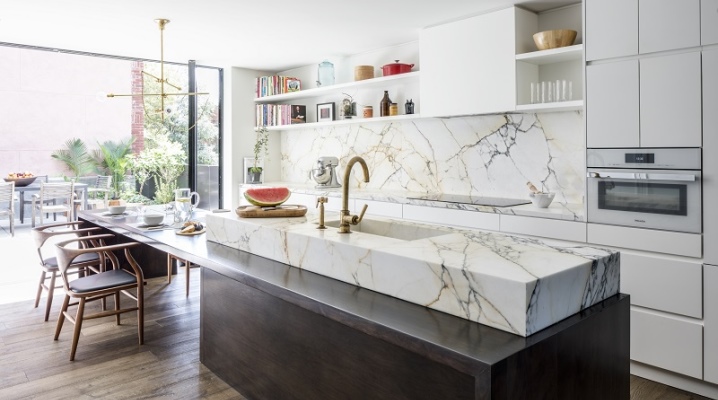
Marble aprons are a stylish and effective solution for kitchen decoration. From the material of this article, you will learn about their features, varieties, as well as design options. In addition, we will show you what to look for when choosing them.
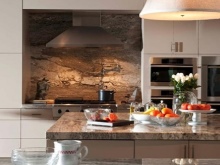
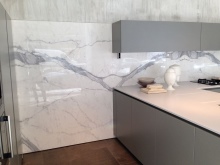
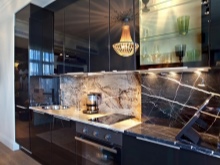
Peculiarities
Marbled kitchen aprons are an alternative to natural stone. Unlike him, they are not as heavy. Imitation marble perfectly integrates into any interior, meeting the operational requirements for finishing materials for the kitchen. This cladding gives the interior a respectable look. It is aesthetically pleasing, durable, and has a wide range of design possibilities. The marble texture hides the dirt typical of the kitchen workspace.
The apron with a natural stone finish has a unique pattern and a huge range of colors. This allows you to choose the finishing options for any color and stylistic design solution. The marble pattern is appropriate in classic, vintage, ultra-modern designs of houses and city apartments. Products made from marble substitutes are not so capricious in operation. They do not need to be polished to maintain their good appearance.
They can be seam and seamless, small (on a part of the wall) or large (located up to the ceiling along the entire wall). Their strength characteristics depend on the type of material used.
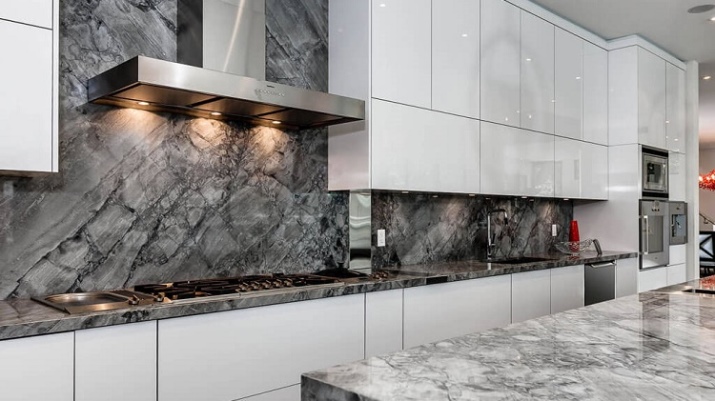
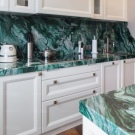
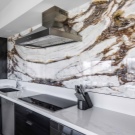
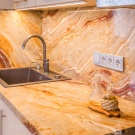
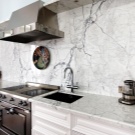
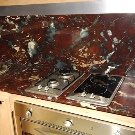
Varieties
Materials for the manufacture of marbled kitchen aprons are different. This is an artificial stone or other facing raw materials with a marble texture. Based on this, there are several varieties of marbled cladding.
- Porcelain stoneware perfectly conveys the texture of an expensive facing stone. The tile, created using a special technology, is resistant to dirt, moisture and grease. It is solid, strong, durable. The disadvantage of this alternative is the complexity of installation with the adjustment of the seams of the elements at the joints.
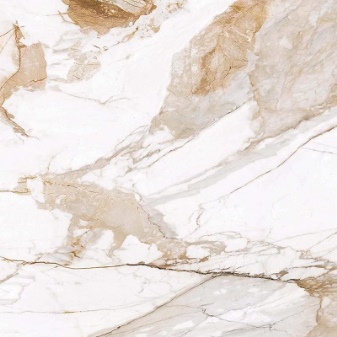
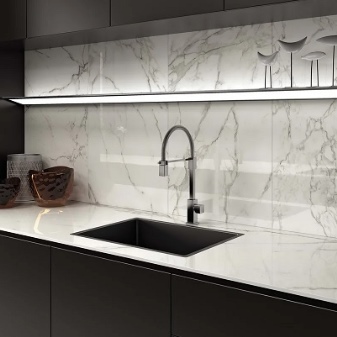
- Agglomerate (crushed marble chips) is durable and scratch resistant. It is cheaper than marble, imitates its texture, but is afraid of the sun and high temperatures. Monolithic kitchen aprons with countertops are made of it, giving the edges a curly shape.
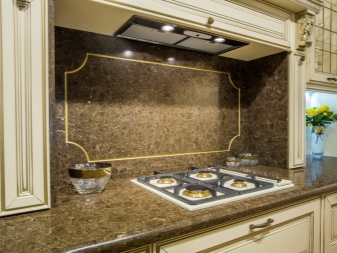
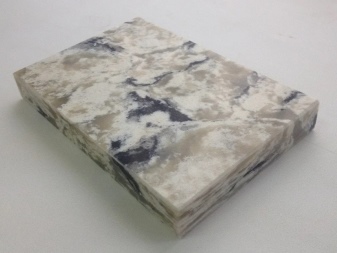
- Acrylic (an artificial stone consisting of acrylic resins, dyes and minerals) is a modern type of material for creating seamless aprons. Its strength is comparable to that of agglomerate, but the material itself is not resistant to scratches and high temperatures. Such an artificial stone is more expensive than other analogues.
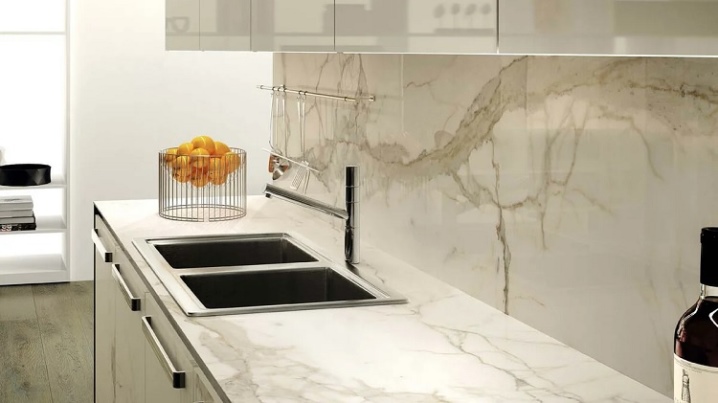
- Marble coated MDF - a practical option for an apron for the kitchen. Surfaces from MDF with imitation of marble are distinguished by a moderate price category and a variety of colors of the front side. They convey the texture of natural stone, are easy to install and dismantle, but not as durable as porcelain stoneware.
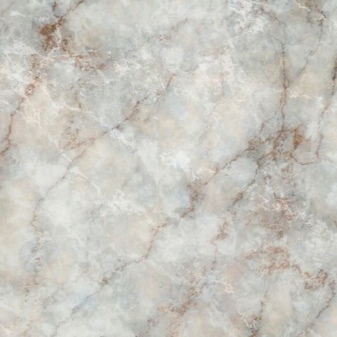
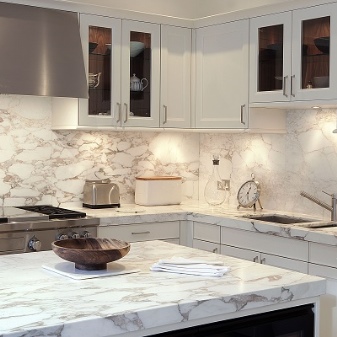
- Skinali (aprons made of tempered glass coated with a marble pattern) are unpretentious in maintenance and use. The surface of the material is resistant to frequent cleaning with detergents and harsh abrasives. Marbled glass apron is made to order and specific parameters.
Its purchase and installation are more expensive than purchasing and laying tiles.
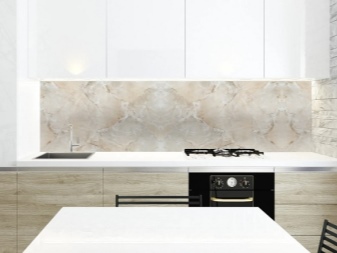
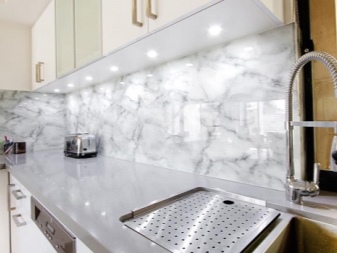
- Plastic aprons differ in budgetary price and ease of installation. In fact, these are panels with a marble pattern. They are attached directly to the profiles or with adhesive for facing tiles.However, this type of cladding is impractical and short-lived. During use, plastic aprons fade, they are unstable to mechanical damage and even scratches.
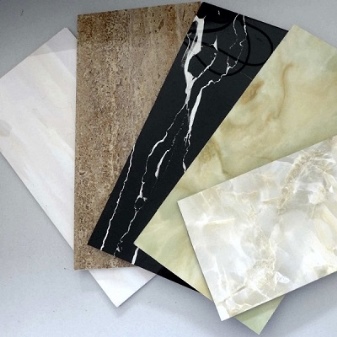
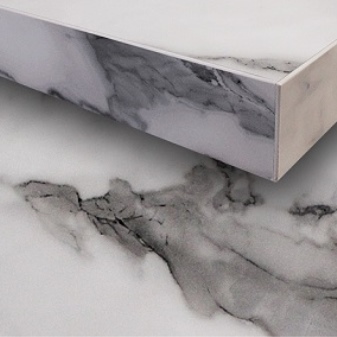
Design options
The design of marble aprons can be very diverse. Depending on the color palette, it is selected to match the corner or to accentuate the working area in the kitchen. Products of the second group differ in contrast against the background of the kitchen set. For example, the apron can be white with golden veins, and the headset can be woody, gray, brown.
Seamless apron design is popular according to fashion trends. In this case, the panel can be located not only between the floor and wall cabinets. For example, it is now fashionable to zone the workspace with an extraordinary apron. No less interesting is the use of aprons complete with a table top.
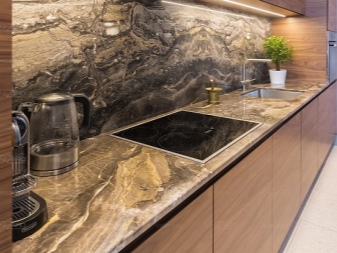
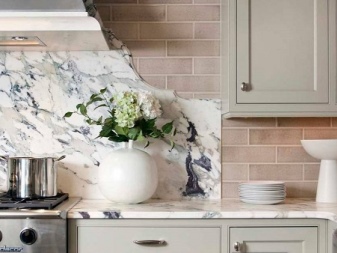
The texture of the marble can be any. Popular solutions are the following colors:
- with a white background, graphite and beige veins;
- monochrome coatings (contrast of white with gray);
- light beige with a golden pattern;
- marble pattern with wavy stripes;
- with a smoky base, brown spots;
- with a dark background and light blue veins;
- with a dark emerald background, light streaks and blotches.
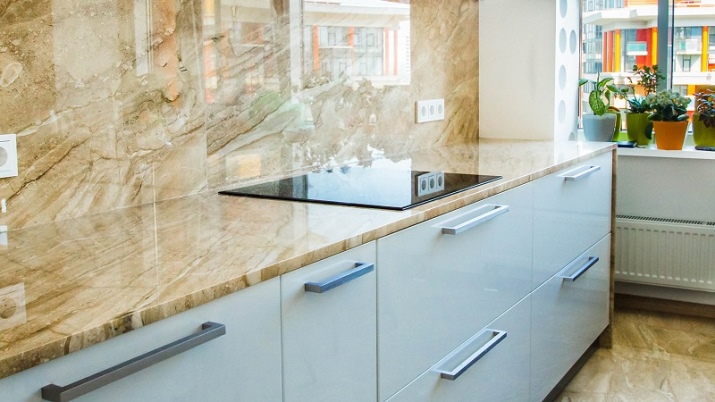
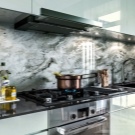
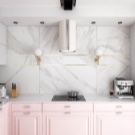
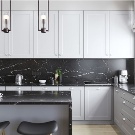
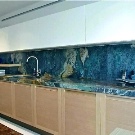
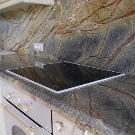
The texture of the coatings can accurately reflect the elite grades of Italian marble, which are quarried in limited quantities. The ideal option is considered to be a white stone without blotches of a different color. It gives the interior a special sophistication and high cost. White and gray kitchens with a marbled apron are a fashion trend in kitchen furnishing.
The type of surface of the apron is matte and glossy. The glossy surface visually enlarges the space. It goes well with the matte texture of the headset.
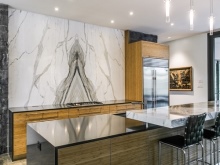
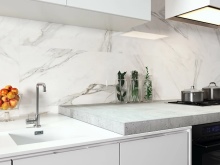
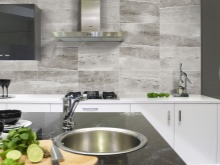
Selection Tips
The choice of a marbled kitchen apron depends on the color scheme of the interior and the preferences of the buyer. The color of the product should be in harmony with the furnishings, the shade of wall and ceiling coverings, and accessories. At the same time, the product should not draw all attention to itself, creating a visual imbalance. You can order a practical version that will not turn yellow over time.
The marble pattern lends a certain austerity to the atmosphere, so it should not be included in Provence. Such aprons are bought for interiors in the style of minimalism, conservatism, neoclassicism, hi-tech. It is preferable for them to purchase or order products in neutral colors (white, gray, black). Looks beautiful in the interior and a brown marbled apron.
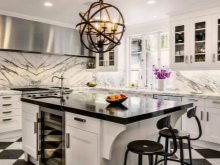
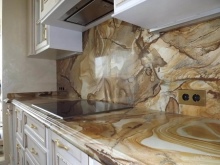
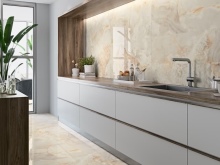
When choosing, take into account the complexity of installation. The tiles need to be customized, taking into account the symmetry of the arrangement. In addition, with seamless cladding, there is no visual division into fragments, like tiles. In this regard, molded aprons are better and more aesthetically pleasing.
The choice may also depend on the type of walls. If they are porous, it is recommended to take the option from a material with a lower weight. As for products with countertops, not all of them are as practical as natural marble. This is often a waste of money, since you cannot put hot dishes on the countertops. You need to handle them as carefully as possible, which is problematic in the kitchen, where there is constant cooking and cleaning.
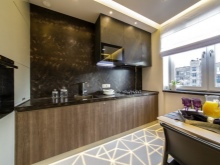
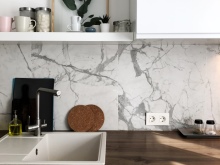
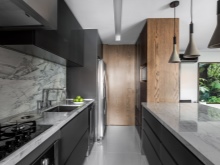
Care rules
Maintenance of your kitchen backsplash depends on the type of material used.
- Varieties of artificial stone must be protected from contact with hot dishes, lemon juice, alcohol, products with coloring pigments. Some species, after prolonged contact with water, can be treated with zero sandpaper.
- Products that are not resistant to scratches wash with a soft cloth without the use of harsh abrasive agents. You need to wash them with the help of special cleaning agents or use a soft cloth and warm water.
- Plastic aprons need careful care. Some panels have an intensive cleaning washcoat.From poor care, the plastic surface quickly turns yellow.
- Suture veneer requires special care. It should not be allowed to get dirty, because in the future it will be impossible to remove dirt. Some types of coatings can be removed from rust using special expensive products.
Care for any type of apron should be regular and timely. Any contaminants (drops of fat, broth, juice, wine) are removed immediately, without waiting for them to become part of the marble pattern.
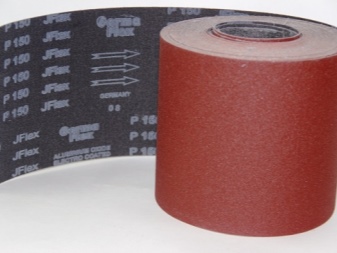
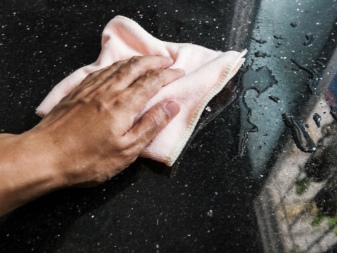
In the next video, you will find the procedure for laying marbled tiles on a kitchen apron.













The comment was sent successfully.